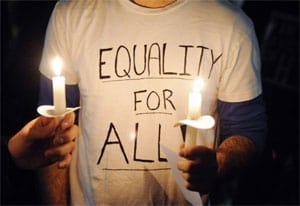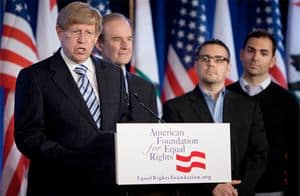Ari Ezra Waldman is a 2002 graduate of Harvard College and a 2005 graduate of Harvard Law School. After practicing in New York for five years and clerking at a federal appellate court in Washington, D.C., Ari is now on the faculty at California Western School of Law in San Diego, California. His research focuses on gay rights and the First Amendment. Ari will be writing weekly posts on law and various LGBT issues.
Follow Ari on Twitter at @ariezrawaldman.
UPDATE: The Ninth Circuit has ruled not to lift the stay. See here for details.
UPDATE: We now know that the Ninth Circuit decided to keep in place the stay of Judge Walker's ruling in the Prop 8 litigation. Though this was expected (see original post below) it is no less unfortunate. As Perry v. Brown — the case is called Perry v. Brown now instead of Perry v. Schwarzenegger because of the change in governors — continues through the federal courts, marriage equality will be on hold in California.
On what basis did the Ninth Circuit justify its ruling? It could not come out and say, "Hey, we're a little scared of this topic, so let's keep the stay in place." Rather, the panel's decision is based on Southeast Alaska Conservation Council v. U.S. Army Corps of Engineers, 472 F.3d 1097, 1101 (9th Cir. 2006), a substantively unrelated case that, in part, concerned a motion to lift an injunction.
According to Southeast Alaska, the fulcrum upon which the Ninth Circuit would determine whether to lift a stay is changed circumstances: "To justify vacating the injunction … [the moving party] must demonstrate that facts have changed sufficiently since the court issued its order." That's entirely true, but with all due respect to the Ninth Circuit panel, the judges missed a crucial point.
Changed circumstances are irrelevant when the requirements for a stay never existed in the first place.
The governing rule that stays can only be lifted when the original reasons for the stay are no longer present assumes that there were valid original reasons for the stay. Here, as the Olson/Boies team argued and as we have discussed before, Prop 8 Proponents failed to meet the requirements for the stay — they failed to show a strong likelihood of success on the merits, failed to show that the balance of hardships favored a stay and failed to show specific irreparable harm in the absence of a stay. The stay was likely issued for political reasons (see below) in spite of the appropriate legal standard for stays of lower court orders. Therefore, the notion that there are no changed circumstances here may be true, but it is also misleading and irrelevant to the question of the validity of the stay when it was issued.
The Ninth Circuit's half-review — it only looked at whether the stay is still valid rather than also looking at whether the stay was ever valid — will do damage to the fundamental rights of gay men and women in California. But, there is a silver lining: This decision in no way affects the underlying case. It just means we have to wait.
ORIGINAL POST, AFTER THE JUMP…
ORIGINAL, EARLIER POST:
On March 17, the legal team led by Ted Olson and David Boies filed its final brief with the Ninth Circuit asking that court to lift the stay that keeps same-sex couples from enjoying the right to marry in California. Olson's and Boies's compelling argument reminds the court that none of the usual requirements for a stay existed in this case and yet by taking away rights from committed same-sex couples, the stay does significant damage to basic fundamental rights. Therefore, the stay should be lifted immediately.
 The marriage equality team has offered a number of arguments over the course of the stay-related briefing — the lack of real harm to Prop 8 proponents from lifting the stay, the enormous burdens on same-sex couples if the stay remains, the changed circumstances that make the stay even less valid now, and so on — but one of the most compelling arguments is that the basic requirements for a stay never existed in this case.
The marriage equality team has offered a number of arguments over the course of the stay-related briefing — the lack of real harm to Prop 8 proponents from lifting the stay, the enormous burdens on same-sex couples if the stay remains, the changed circumstances that make the stay even less valid now, and so on — but one of the most compelling arguments is that the basic requirements for a stay never existed in this case.
For a court to grant a stay, the party wanting the stay — the moving party, or party making the motion for the stay — has to make a "strong showing" that it "has a likelihood of success on the merits." In other words, the moving party has to show that it is more likely than not to win the underlying case. But, the Prop 8 proponents never showed that. Their case was so wholeheartedly decimated at the district court and their appellate argument was so flimsy that no rational judge could find a likelihood of success on the merits.
What's more, as Olson and Boies note in their most recent brief, there is no conceivable way the Prop 8 proponents could meet that likelihood standard. The fact that the Ninth Circuit certified a question to the California Supreme Court to get an "authoritative determination" about the Ninth Circuit jurisdiction — this is the standing issue — means that the court's jurisdiction to hear the case is up in the air, completely uncertain, as yet unknown. Therefore, "[e]ven if this Court has the authority under Article III to maintain a stay when it harbors doubts as to its own jurisdiction, the existence of such doubts means that the maintenance of a stay is inappropriate because the absence of a clear path to jurisdiction precludes the possibility that the party asserting jurisdiction has made the requisite “strong showing” of likelihood of success on the merits." In other words, if no one knows if the Prop 8 proponents have standing to appeal Judge Vaughn Walker's decision declaring Prop 8 unconstitutional, the Prop 8 proponents could not show that they would be successful in the case.
This seems like an effective, air-tight argument. Why, then, do I feel that the stay is likely to remain in place?
Let's hope I am wrong, but here is some analysis:
If I were making the Prop 8 Proponents' argument on maintaining the stay, I would argue that a showing of likelihood of success is independent of a showing on standing. Courts have jurisdictions to determine if they have jurisdiction, but the question of a stay refers to the moving party's likelihood of success on the merits, assuming the case ever reached the merits. In other words, the fact that jurisdiction is unsettled is irrelevant to success on the merits. That is a tough argument to make, but not unreasonable. Olson and Boies are correct: If you cannot even get to the merits, you can hardly argue that you will be successful once you get there.
So, let us assume that the Olson/Boies stay argument is air-tight. The stay is still unfortunately likely to remain for two reasons.
First, courts are loathe to question either themselves or lower courts when it comes to stays. In the federal courts, stays are even less likely to be overturned than lower court orders/decisions. Generally, while an appellate court can review the legal requirements for a stay on its own, it will generally defer to the administrative decisions and factual determinations of the lower court. And, if the stay is granted by the appellate court itself, lifting the stay is even less likely, given how loathe courts are to overturn themselves.
Second, for better or for worse, marriage equality is the classic "hot button" political issue that is occupying the political sphere. We may argue that our rights should not be subject to the whims of politics and legislatures, but our rights are indeed the subject of debate in every state and in Congress. And, in most cases, state legislatures and the U.S. Congress are working out issues of marriage equality through political debate in addition to litigation. In that context, courts gets skittish. Even judges who agree that arguably fundamental individual rights should not hinge on a given year's political majority do not like to dangle their feat into political matters. Therefore, even though the "political-ness" of the underlying issue in a given case is not a factor to consider in granting a stay, the controversial nature of the case tends to encourage courts to put on the breaks — better maintain the status quo while the political and judicial paths work themselves out.
I offer these arguments with a heavy heart. I would like to see the stay lifted, but getting stays lifted in even run-of-the-mill civil cases is difficult, let alone in hot button political cases. We can only hope that the Ninth Circuit will realize the inconstency, notice the inequality that the stay maintains and bring marriage equality back to California post haste.




